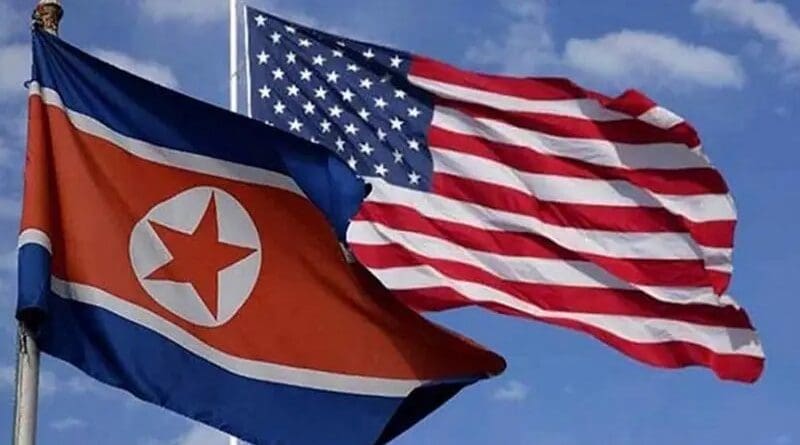Is Biden Summoning ‘Strategic Patience’ With North Korea? – Analysis
By VOA
By Christy Lee
As the stalemate between the United States and North Korea persists, some experts are wondering whether the Biden administration is returning to the Obama-era policy of strategic patience.
Ken Gause, director of the Adversary Analytics Program at CNA, thinks the U.S. could “by default” end up in strategic patience, which he described as a “kind of status quo and which is the comfort zone for the United States.”
Strategic patience refers to the Obama administration’s lack of action after a deal to freeze and disable the Yongbyon reactor collapsed in 2012.
Gause added, “After that fell through, they really didn’t try to go back to the negotiating table. … The Biden administration is made up of a lot of people that served in those administrations, and probably, their latitude for trying new things with North Korea is probably somewhat limited.”
Others argue that Biden’s North Korea policy differs from Obama’s, citing the administration’s willingness to engage North Korea.
“The Biden administration, in contrast to the Obama administration, [has] expressed public concern about North Korea’s nuclear development and recognized that it cannot be kicked down the road too far,” said Scott Snyder, director of the program on U.S.-Korea policy at the Council on Foreign Relations.
U.S. State Department spokesperson Ned Price on Thursday reiterated that the U.S. is ready for dialogue with North Korea.
“When it comes to the United States, our goal continues to be the complete denuclearization of the Korean Peninsula,” Price said. “We are prepared to engage in diplomacy toward that objective.”
Price continued: “We have made clear to them that we are prepared to meet to engage in principled negotiations anytime, anywhere, anyplace.”
Despite the calls, however, North Korea has not responded, and the Biden administration is faced with how to resume nuclear talks that have been stalled since late 2019.
Robert Manning, a senior fellow at the Atlantic Council, said, “The mutual distrust on both sides has deepened” after the failed Trump-Kim summit in Hanoi in February 2019, which cast a shadow on “prospects for serious diplomacy.”
Also, according to Snyder, the Biden administration’s effort to engage North Korea has become harder because the regime is occupied with dire domestic problems.
“The Biden administration faces adverse circumstances around its efforts to engage with North Korea — in the form of North Korea’s domestic economic stress, the pandemic and North Korea’s internal political rectification campaign,” Snyder said.
North Korea faces a slew of issues, including “tense food situations” that its leader, Kim Jong Un, announced in June, which were exacerbated by heavy rains in August that damaged crops.
The regime is struggling to recover from a failed economic plan, one made worse by border closings aimed at keeping out COVID-19 cases. It has yet to begin vaccinations for COVID-19, having turned down UNICEF’s offer of China’s Sinovac vaccine.
The Biden administration, after eight months in office, is involved with multiple foreign policy issues of its own.
It faces the aftermath of the U.S. troop withdrawal from Afghanistan, the pressure of restarting the Iran nuclear deal, and the rise of China as an assertive competitor.
Gause believes Pyongyang is not likely to return to the negotiating table until it obtains upfront concessions from Washington. The North Korean regime sought sanctions relief from the Trump administration, and its successor, the Biden administration, said it will not ease sanctions until North Korea takes steps toward denuclearization.
“United Nations sanctions on the DPRK remain in place, and we will continue to implement them, including through diplomacy at the United Nations and with the DPRK’s neighbors,” said a State Department spokesperson in an email to VOA’s Korean Service this week, using the acronym for the Democratic People’s Republic of Korea, North Korea’s official name.
Anthony Ruggiero, a senior fellow at the Foundation for Defense of Democracies, said the U.S. should not lift sanctions before North Korea makes a move toward denuclearization.
“Since 1994, the Kim family has convinced American presidents to provide significant sanctions relief and other benefits for the promise of North Korea’s denuclearization,” Ruggiero said. “And each time, the Kim family has failed to deliver.”
Ruggiero continued: “Biden should change his approach and increase the pressure on North Korea by implementing existing sanctions.”
Some analysts warned that North Korea could return to brinkmanship to put pressure on the Biden administration.
David Maxwell, a senior fellow at the Foundation for Defense of Democracies, said North Korea’s demand for sanctions relief will continue in a form of “blackmail diplomacy, which is really about using threats, increased tensions, in provocations.”
Repetition of past provocations such as border clashes, Yeonpyeong Island attacks, and missile and rocket tests could occur, according to Maxwell.

